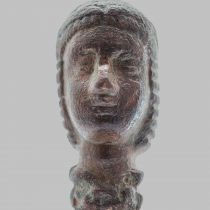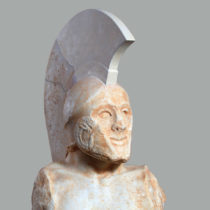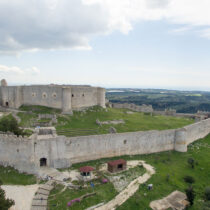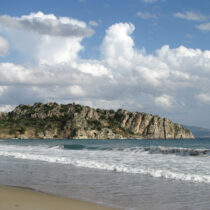The conical sundial in the Archaeological Museum of Piraeus
It was an everyday occurrence in Ancient Greece to use sundials in fine weather to calculate the passage of time.
Solving the mystery of a mummified lung
An international team of researchers might have found the answer of how an organ of Queen Arnegunde was preserved while her body was skeletonized.
Bigger brains led to bigger bodies in our ancestors
New research suggests that humans became the large-brained, large bodied animals we are today because of natural selection to increase brain size.
Deceptive feathered dinosaur finally gets a name
Solving one of the longest cases of mistaken identity, University of Alberta PhD candidate Greg Funston recently described a new genus and species of toothless dinosaur from Alberta.
Dino dinner, dead or alive
New research conducted at Trinity College Dublin suggests that T Rex and Velociraptor might be better remembered as oversized, scaly or feathered hyenas.
Vladimir is thrilled by the Sungirian man
Archaeologists studied tools made by Homo sapiens who had lived near Vladimir.
What helped deep sea creatures survive asteroid strike that wiped out the dinosaurs?
Study of fossil shells solves unanswered question of how deep sea creatures survived asteroid strike during immense upheaval of the world's oceans.
Mass grave containing 80 skeletons found at the Faliron Delta
Archaeologists excavating at the site of the Faliron Delta found a mass grave containing 80 skeletons.
A grave with a mummy was found in Mongolia
Archaeologists have unearthed mummified human remains along with animal remains and artefacts from a grave at the Altai Mountains in Mongolia.
Barque station of Queen Hatshepsut discovered on Elephantine Island
According to Dr Felix Arnold, the field director of the mission, the building served as a way-station for the festival barque of the god Khnum.
A Kore in the Hermitage Museum
On 8 April 2016 an exhibition of an Ancient Greek sculpture from the Acropolis Museum (Athens) has opened in the State Hermitage – an Archaic Statue of a Kore.
Archaeology Program in Los Bañales
The University of Navarre offers the possibility of excavating a Roman city in Spain.
New species of extinct rodent discovered in Israel
The new-found species has unique features that offer fresh insight into the migration patterns of ancient animals from Asia to Africa.
Prehistoric peepers give vital clue in solving 300 million year old ‘Tully Monster’
University of Leicester researchers identify ancient ‘Tully Monster’ was a vertebrate.
Headdress reconstruction throws light on hunter-gatherer rituals
A research team led by archaeologists at the University of York used traditional techniques to create replicas of ritual headdresses made by hunter-gatherers 11,000 years ago in North Western Europe.
Late Roman glass kilns discovered at the foot of Mount Carmel
Late Roman glass kilns indicate that the Land of Israel was one of the foremost centers for glass production in the ancient world.
172-year-old Saiwan boundary marker stone found
HKU surveyors propose the stone be made an AAB Grade I listed object.
Roman Imperial leaders had wine empire away from the battlefield
Archaeologists from the University of Sheffield have uncovered a unique insight into the life of the Roman Empire's most prominent landowners.
Handwriting analysis provides clues for dating of old testament texts
Inscriptions dating to 600 BCE suggest widespread literacy at the time, say TAU researchers.
Neanderthals may have been infected by diseases carried out of Africa by humans
A new study suggests that Neanderthals across Europe may well have been infected with diseases carried out of Africa by waves of anatomically modern humans, or Homo sapiens.
New discoveries into how an ancient civilization conserved water
Aerial imagery technology is helping researchers locate and study areas that are showing them how less urbanized populations conserved water for drinking and irrigation.
Visiting & Early Career Fellowships 2016-2017
Applications are invited for a Visiting and an Early Career Fellowship at the BSA for 2-3 months in the academic year 2016-17 in any branch of the arts or sciences related to Greece.
SASCAR International Conference
The Italian Archaeological School at Athens presents the SASCAR International Conference, which will take place at the School from May 12th to May 14th, 2016.
New models predicting where to find fossils
An international team of scientists have developed a way to help locate fossils of long-extinct animals.




























